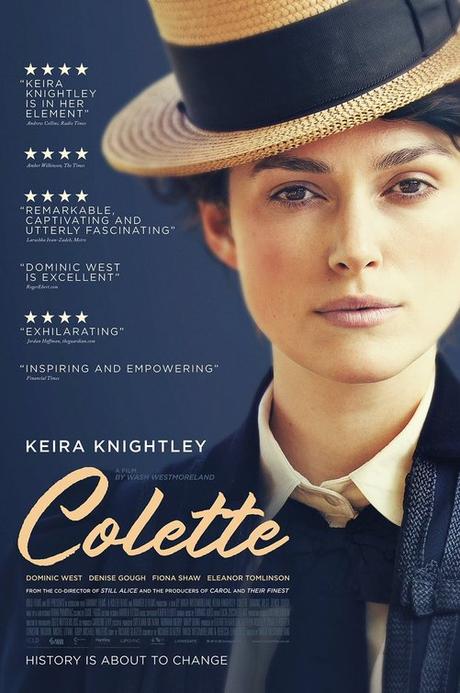 On this, the day after the Day of the Girl 2018, I want to say that I particularly planned to be reviewing a movie about a woman ahead of her time. Alas, it is, as so many things in life are, a complete coincidence.
On this, the day after the Day of the Girl 2018, I want to say that I particularly planned to be reviewing a movie about a woman ahead of her time. Alas, it is, as so many things in life are, a complete coincidence.
But I can think of no better way to follow the Day of the Girl than with "Colette," the story of a one-namer from before being a one-namer was a thing.
If you're wondering who in the world Colette is right now, you're not alone, and you're probably not French. Turns out there are a lot of really incredible women throughout history whose stories just haven't been told broadly.
Also turns out that most of the French literature that made it into curriculums outside of France is by men (shout out to Alexandre Dumas and Victor Hugo). So, this is going to be a history lesson with some film commentary sprinkled in. Prepare to learn.
Speaking of Victor Hugo, Colette and he actually have something in common (beyond the whole French literature thing), they both wrote stories that were adapted into widely known musicals. Hugo's is of course "Les Miserables." And Colette's "Gigi" was adapted by Lerner and Loewe.
The start of her marriage to Henry Gauthier-Villars (Dominic West) is where the film begins, at which point Colette is still known as Sidonie-Gabrielle Colette (Keira Knightley). At the start of their marriage, Colette is thrown into a whole new world, Paris in the late 1800s, where her husband, who was more widely known by his nom-de-plume, Willy, introduces her to the idea of having a public persona. He also introduces her to the world of writing...and you can probably guess where this is going...
Colette writes a series of wildly popular novels, starting with "Claudine à l'école," but because she is a she, it's her husband's pen name that goes on the finished products. It's from this frustration (to put it mildly) Colette is born.
The real kicker is it was pretty widely known at the time that she'd written the books, but her husband refuses to let her name be on them. And in one scene he actually locks her in a room and forces her to write the next Claudine book. It's a scene that is both intolerably cruel and revelatory for the audience and the author. It's also a scene that by many accounts actually happened.
From this moment on, Colette finds little joy in writing (understandably) and looks for it elsewhere. She finds it in art, theater (pantomime in particular), and companionship with other women. The most fabulous of whom is Missy (Denise Gough), aka Mathilde de Morny (another incredibly fascinating woman of history...but I will not be sidetracked).
But what is so lovely, is yes, she's angry, but she's never bitter, she's not vindictive, she is empowered. She knows her power and she uses it, ultimately to leave her husband and get her name on those books. The moment of confrontation is something to behold. Keira Knightley is all of those things at once, and I apologize to Dominic West, but I was still recovering from her monologue when he responded to it, so...
Colette went on to write such classics as the aforementioned "Gigi" and a book you may have heard of via one of its many film adaptations, "Chéri." She had authored more than 30 works before she passed away in the 1950s, but her impact goes well beyond her writing (and I'm not just talking about the fact that she discovered Audrey Hepburn).
My takeaway from this movie was that there have been trailblazers pushing us forward and towards our better selves throughout history. Telling their stories is how we move forward. Colette was questioning the norms of gender and sex in the early 1900s, decades before members of the LGTBQ community could even dream of being accepted for who they are. But what would it have meant if no one shared that story? A century later, it's still being told and still (from the sounds of the theater where I saw it) making people uncomfortable and changing minds. So never underestimate the power of storytelling, it's been changing hearts and minds since the beginning of time.
...bi-daily smile...
